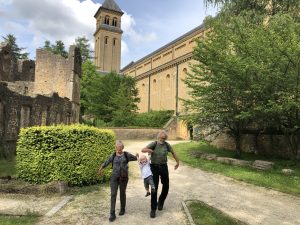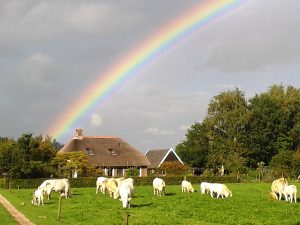Thanks to my mother, I started loving nature and gardening almost since birth. Thanks to my grand-father and the uncle who took over his farm, I thought about becoming a farmer myself. At high school, I realized that it was plant and animal life that made farms so attractive to me, and I discovered that the society even pays people who make plants and animals their job; I decided to study biology. Biology appeared being more than plants and animals, and after a masters with animal physiology as major and biochemistry and biophysics as minors, I did my PhD by studying biological repair of DNA damaged by gamma-radiation.
It allowed me satisfying the curiosity that was stimulated by my father and exploiting the quantitative attitude of my spirit. Replacing military service by alternative development work in Mali opened the opportunity to combine my university knowledge with the passion of my youth, farming. Starting with adding ecology to my fields of knowledge, I transformed myself into an agrobiologist, focusing myself for more than 45 years on African rural development. I have lived in three but worked in 27 African countries. I applied knowledge and insights in animal husbandry, in crop production, in agroforestry and fisheries. My entry point became environmental potentials and bottlenecks, with the carrying capacity of natural resources as instrument.
Being quantitative, I realized increasingly that in most parts of Africa the natural carrying capacity is threatened by overexploitation through overpopulation. Environmental degradation and inherent decrease of productivity requires a combination of optimal management of natural resources with external inputs such as fertilizers. Having started working as a “green” in Africa, I accepted the use of chemical fertilizer as a necessary evil. I developed and tested ideas how to exploit this option for crop- and livestock intensification, for rangeland and soil fertility management, for desertification control, and for decreasing tree – crop competition in agroforestry.

To transform these approaches into opportunities for rural development and smallholder family farming, I had to combine optimal use of internal and external inputs with dovetailing of agro-ecological and socioeconomic conditions. My love for nature and my biological knowledge and experience warned me against both the excrescences of intensive industrial agriculture and the unfounded optimism of biological farming. Since years I try bridging agro-ecological approaches with conventional technologies for sustainable high productive agriculture. Increasingly I am convinced, that in an over liberalized world the food security will be better served by family-farming in a national context than through industrial agriculture with its shareholders looking for short time benefits.
I like sharing my knowledge with others; I have countless publications, gave hundreds of lectures, presentations and trainings in more than 20 countries, and did interviews for journals, radio and TV in at least 10 of them. See the Publications section for an overview.
For knowing me better in a different way, since 2014 I am married with Wil Kroon, who has a nice web-site herself: www.kroonwoordendaad.nl . With Wil, I am living again in the Netherlands, where I am actively involved in discussions about the future of agriculture. And thanks to the birth of Alexander, son of Jeroen and Lisa, I became grandfather at the age of 75.


